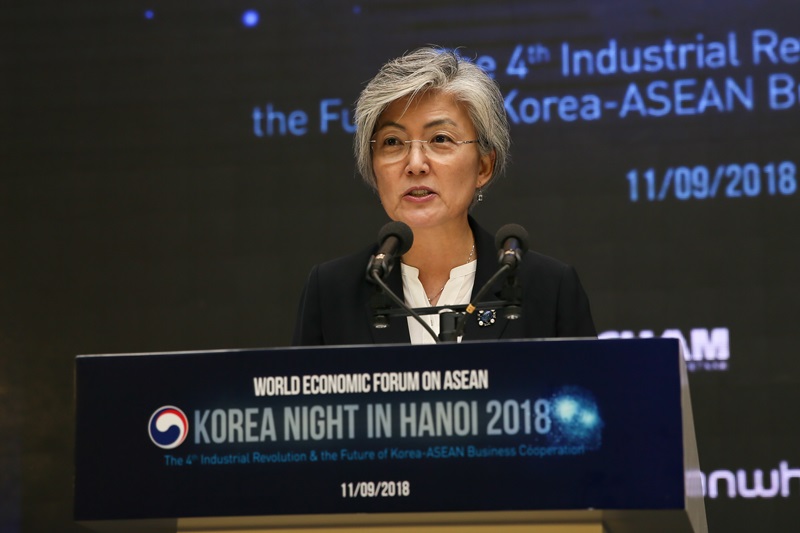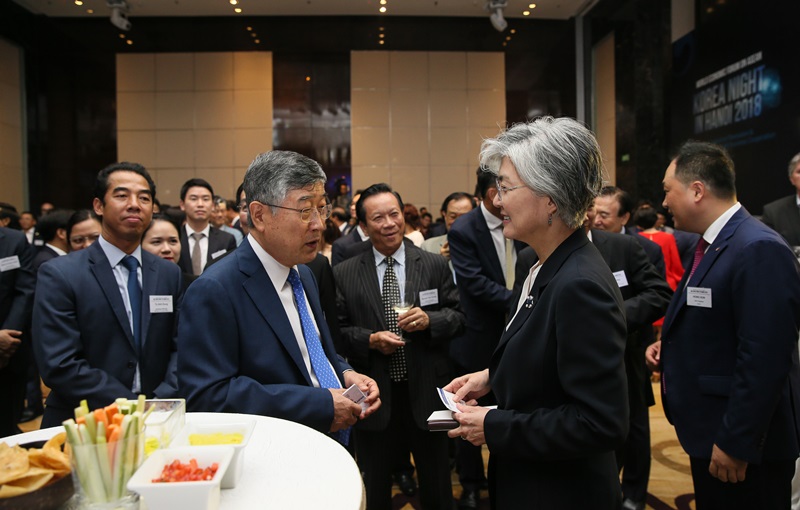-
About the Ministry
About the Ministry
- Press
- Countries & Regions
- Policy Information
- Life In Korea
Minister
- Notices
- Ministry News
- Press Releases
- Press Briefings
- Speeches & Published Materials
- Newsletter Service
- Diplomatic White Paper
[Former] Celebratory Remarks at Korea Night in Hanoi, Vietnam
- Date
- 2018-09-14
- hit
- 6193


(As delivered)
Thank you so much, good evening, ladies and gentlemen. What a great turnout.
I don't think I've been to another reception hosted by an embassy of Korea that had such a huge turnout. I think this is just an indication of our gratitude and keenness for the World Economic Forum under the leadership of Professor Schwab, our keenness for ASEAN, our keenness and interest in the Fourth Industrial Revolution, and the future of Korea-ASEAN business cooperation in this exciting global context. So thank you so much, and I have a speech prepared, and I understand that the Vietnamese translation will be put on the screen, so I have to stick to my script. But I will not hestitate to stop if I hear too much noise going on in the background.
His Excellency Vietnamese Minister of Science Technology of Vietnam Mr. Chu Ngoc Anh,
Honorary KORCHAM in Vietman Chairman Mr. Kim Jung-in,
and Chairman 허창수 Federal of Korea Industries,
and of course the Founder and Executive Chairman of the World Economic Forum Professor Klaus Schwab,
Distinguished Guests,
Ladies and Gentlemen,
I'm indeed delighted to welcome you to the Korea night event here on the margins of WEF on ASEAN. Thank you so much all for coming, and indicating your interest in forging closer ties between Korea and Vietnam and of course Korea and other members of ASEAN as well. Thank you, first of all your leadership, Professor Schwab, Minister Anh and other dignitaries for your support and leadership.
We are all here because ASEAN is vital to Korea's prosperity and peace, and I would like to say vice-versa, and Vietnam is at the center. I need not emphasize that Vietnam is already Korea's largest trading partner in ASEAN, the most popular investment destination in ASEAN, and the country that receives the highest number of Korean visitors in ASEAN.
Behind these remarkable achievements lies the strong commitment of the Vietnamese and ROK governments, together with the entrepreneurship of Korean and Vietnamese businessmen and women.
I would like to say I first visited Vietnam in 1997, more than 20 years ago, long before the country really took off on economic development. But even then, it was very clear that between the two countries there is much in common, commonness which would fuel the expansion in bilateral ties. And one thing that stood out more than anything else was the strong commitment to learning and to hard work on the part of the people, the drive of parents to educate their children so that they may have a better future, and the emphasis placed upon the people, as human resources but of course as beneficiaries and ultimate judges of government policies.
I've been back a few times more since then, in different capacities, under different circumstances, but this shared drive and outlook have remained very steady and has served as the foundation of the vibrant, future-oriented ties that now bind the two countries.
And against this backdrop, President Moon Jae-in used the opportunity of the APEC summit in Danang last year to spell out the outlines of our New Southern Policy, which aims to take the ROK-ASEAN partnership to a whole new level of co-prosperity and peace, based on the shared commitment to the people. And thus, the three Ps of our policy are -- people, prosperity and peace.
In March this year, President Moon came back to Vietnam on a state visit, and engaged with the top leaders of this country to spell out concrete ways in which our New Southern Policy would go hand in hand with Vietnam's priorities. And the foundation is always the people.
The growing number of Korean-Vietnamese families are a valuable resource, and my government is constantly upgrading the support systems for their welfare and happiness so that they can act as a bridge between the two countries.
Another good example of investing in and enabling the people is VKIST, the Vietnam-Korea Institute of Science and Technology, the ground-breaking for which was made during President Moon's state visit.
Supported by KOICA, my government development cooperation agency, VKIST will enable young Vietnamese students to pursue their dream of realizing a 'modernized industrial country.'
As for co-prosperity, Korea is beefing up or launching ambitious projects with Vietnam and other ASEAN countries to meet the challenges of the 4th industrial revolution. The goal is to generate the momentum for sustained, shared future growth, in smart cities, smart factories, e-government, fintech, all enabled by 5G and other advanced IT technology.
And as Professor Schwab makes clear in his seminal book on the Fourth Industrial Revolution, people must be squarely placed at the center of our joint endeavors. I am no doubt that Korean and ASEAN business leaders gathered here will have much to contribute in the coming years in a vast array of sectors -- infrastructure, energy, health, automobile, the environment, to name just a few.
And as for peace, after a year of intense diplomatic endeavors, the change from confrontation and tension to engagement and dialogue has greatly strengthened the chance for a peaceful resolution of the North Korean nuclear issue, and the establishment of lasting peace on the Korean Peninsula. The full support of ASEAN and its member countries has been instrumental in bringing about this change.
As a favorite saying of the Vietnamese goes, walking with a friend in the dark is better than walking alone in the light. And ASEAN has indeed been our friend throughout the dark times of rising tension. But now that we are seeing the light at the end of the tunnel, your companionship will continue to be instrumental, and also will be in your self-interest.
Because, a nuclear-free Korean peninsula that is wholly at peace will connect Southeast Asia and Northeast Asia into a conjoined sphere of peace and prosperity, creating new development and business opportunities for all to share. And so, as we go forward in what may seem at times to be a roller-coaster ride of diplomatic engagements, we will continue to count on the full support of ASEAN and its member countries.
Ladies and Gentlemen,
We have an opportunity to enhance the collaboration in all three areas -- people, prosperity, peace -- because President Moon hopes to host a very special ROK-ASEAN Summit towards the end of 2019, a year in which will celebrate the 30th anniversary of the dialogue partnership. The occasion will be much more than just a commemoration. It will solidify the ground footing for our New Southern Policy and open the era of a people-centered community of peace and co-prosperity making the most of the possibilities of the Fourth Industrial Revolution. And I do hope everyone here will support the Summit process and become actively engaged in the preparations in one form or another.
Thank you once again for all of your attention and support, and thank you for coming.
/End/




